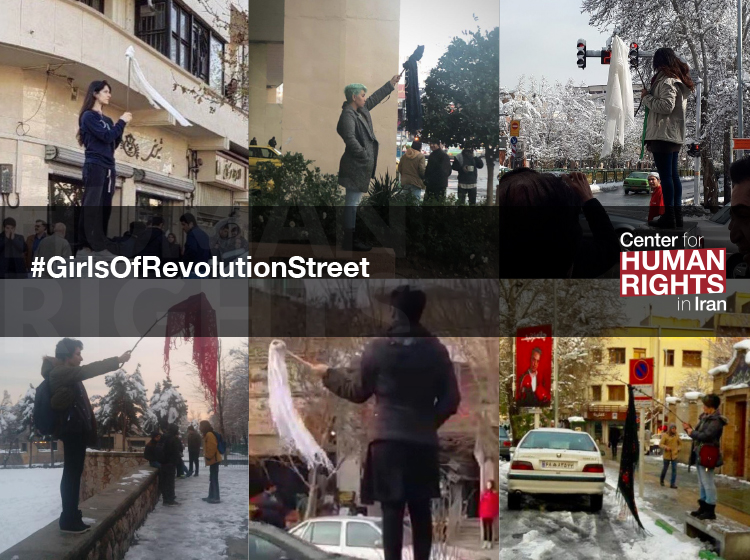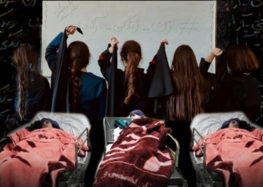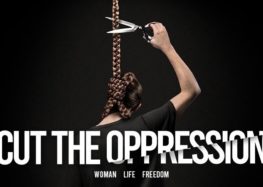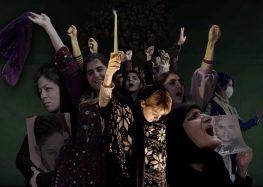“Girls of Revolution St” Protest Ignites Debate on Iran’s Compulsory Hijab

Iranian women protest their country’s hijab law by waving their headscarves in public.
Several women protested against Iran’s compulsory hijab law in the streets of Tehran and Isfahan on January 29 and 30, 2018, by publicly removing their headscarves and waving them like flags while standing on a platform.
The police detained at least one of the peaceful protesters, Narges Hosseini, who can’t afford to post her bail amount, the Center for Human Rights in Iran (CHRI) has learned.
“The bail is too high and Hosseini’s family can’t afford it,” a source close to Hosseini told CHRI. “The assistant prosecutor agrees but he says Narges knows what a grave and dangerous act she committed.”
The women were mimicking the act of civil disobedience first exhibited by Vida Movahed on a sidewalk on Revolution St. in Tehran on December 27, 2017. Photos of Movahed’s silent protest went viral on social media, turning her into a symbol for women who oppose compulsory clothing regulations.
The 31-year-old disappeared for a month after the photos appeared, resulting in Iranians expressing concern for her on social media with a hashtag translating to, “Where is the Girl from Revolution St?” English speakers followed suit with the hashtag, #Where_Is_She.
Iranian attorney Nasrin Sotoudeh told CHRI that she visited the 128th Police Station in Tehran on January 28 and was informed that Movahed had been released on bail.
Now referred to as “The Girl From Revolution St.,” Movahed has been refusing interview requests.
Ongoing Protest
On January 29, several women in Tehran and one woman in Isfahan shared images of themselves on social media repeating Movahed’s peaceful protest.
Hosseini was arrested by the police on the morning of January 29 soon after she began waving her scarf on the street, the source close to Hosseini, who requested anonymity for security reasons, told CHRI.
She was transferred to Shahr-e Rey Prison, south of Tehran, and held on bail set at 500,000 million tomans ($135,000 USD).
Two hours after Hosseini’s protest, women in Tehran and Isfahan repeated the action and “The Girls of Revolution Street” became a hot topic of discussion among Iranians online.
Photos of women and men in different Iranian cities repeating the act were shared on social media throughout January 29 and 30.
Women’s rights activists in Iran have long protested the country’s paternalistic culture, which resists gender equality and favors men over females except when it comes to traditional roles, such as child rearing.
This culture pervades everyday life in Iran. For example, diyah (“blood money”), which is paid as compensation to victims who have experienced bodily harm at the hands of another, is paid to women at half the rate paid to men. The same applies to inheritances.
Court testimony by a woman is considered half as valuable as that of a man’s and married women cannot divorce or travel abroad without their husbands’ permission. Many university topics are also restricted to male students and women are also discouraged from joining—and discriminated against—in the workforce.
“The Girls of Revolution St. will mark a new era in Iran’s history,” tweeted Iranian writer Hossein Vahdani on January 29. “How glorious and meaningful it would be if these young women held the key to the liberation of this land from dictatorship.”
Political activist Mohammad Ghaznavian tweeted: “The action by the Girls of Revolution St. is the street manifestation of a group spirit; the overflow of decades of frustration aimed at breaking the chains of reactionary-ism, inequality and gender oppression.”
Women who voluntarily wear the hijab also expressed support for the protest, which emphasizes choice rather than restrictions.
“Wearing the hijab is my choice, not something forced on me by my family, society or the workplace,” tweeted Zahra Safyari on January 29. “I am happy with my choice but I am also against the mandatory hijab and admire the Girls of Revolution St.”
“There should be no compulsion in religion or with the hijab,” she added.
Meanwhile, a reformist politician criticized the act of civil disobedience.
“It appears that these are part of the same suspicious, organized actions that sparked the recent protests. This time they are targeting women. They are scheming to take protests to inside the home. These actions are not worthy of enlightened women who generally seek more freedoms and human and social rights,” said Tehran City Council adviser Fatemeh Rakeie on January 30.
The reformist council member, who also chairs the Society of New Thinking Muslim Women, advised people to ignore the protests.
“I don’t believe these are political or social crimes,” she said. “No one needs to be arrested. If society and enlightened women ignore them and don’t take them seriously, they will disappear on their own.”






